Welcome to another issue of The Newport Cornucopia where we dig through the newspapers archives for interesting news articles and adverts. All articles are posted verbatim and most headlines are original (headlines in quotes are my own).

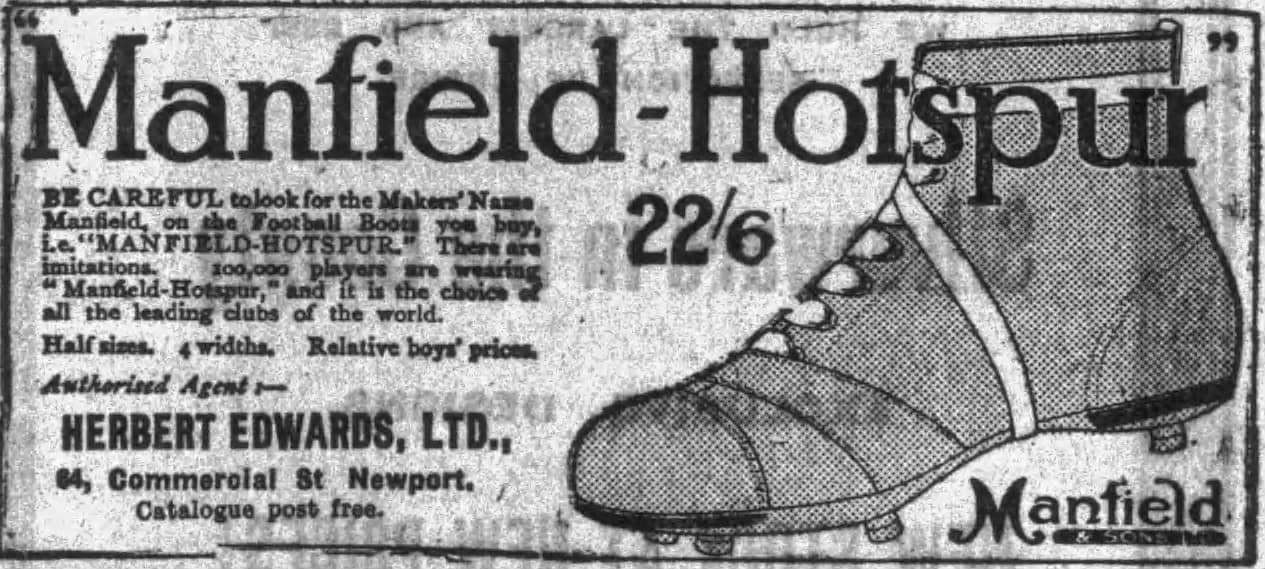

'The Need For A Sign At The Hand Post'
To the Editor of the Monmouthshire Merlin.
Sir,—Will you have the goodness to do the public the favour to notice in your widely-circulating paper, the circumstance of the want of a proper hand-post beyond Cairo (Caerau?), where two roads branch for Bassaleg, &c., and for Risca, &c.
There is a very old scarecrow, it is true, standing, but the indexes point to the beer-house in front, and not to the roads, and there is a total absence of any letters.
I think, sir, a penalty could be inflicted upon certain parties, under an Act of Parliament, for the absence of so necessary a public benefit.
I am, sir, your obedient servant,
Newport, Sept, 9, 1842.
VIATOR.
— Monmouthshire Merlin, 17th September, 1842

'North Street Trams?'
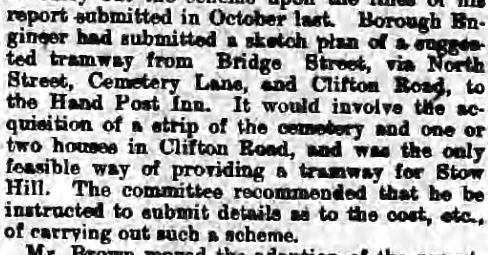
Before the tram line was installed on Stow Hill, a proposal by the borough engineer in 1900 suggested running along Bridge Street, up North Street, Cemetery Lane (runs alongside the old cemetery) and joining Clifton Road. Based on the need to lower Stow Hill to allow the trams to ascend, something similar would no doubt have had to have been done to go through Cemetery Lane.
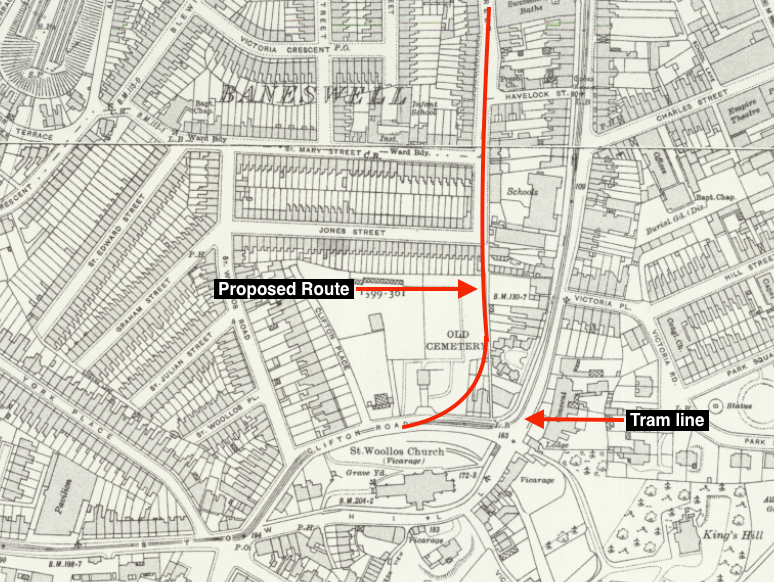

Sheep Stealing
On Thursday night a lamb belonging to Mr. Iggulden, was slaughtered in his field on the Caerleon-road. It is supposed the fellows were disturbed in their operations, as they decamped, leaving the carcase (sic) of the lamb in a sack in the field, behind them. It is hoped that the sack may lead to the discovery of the thieves.
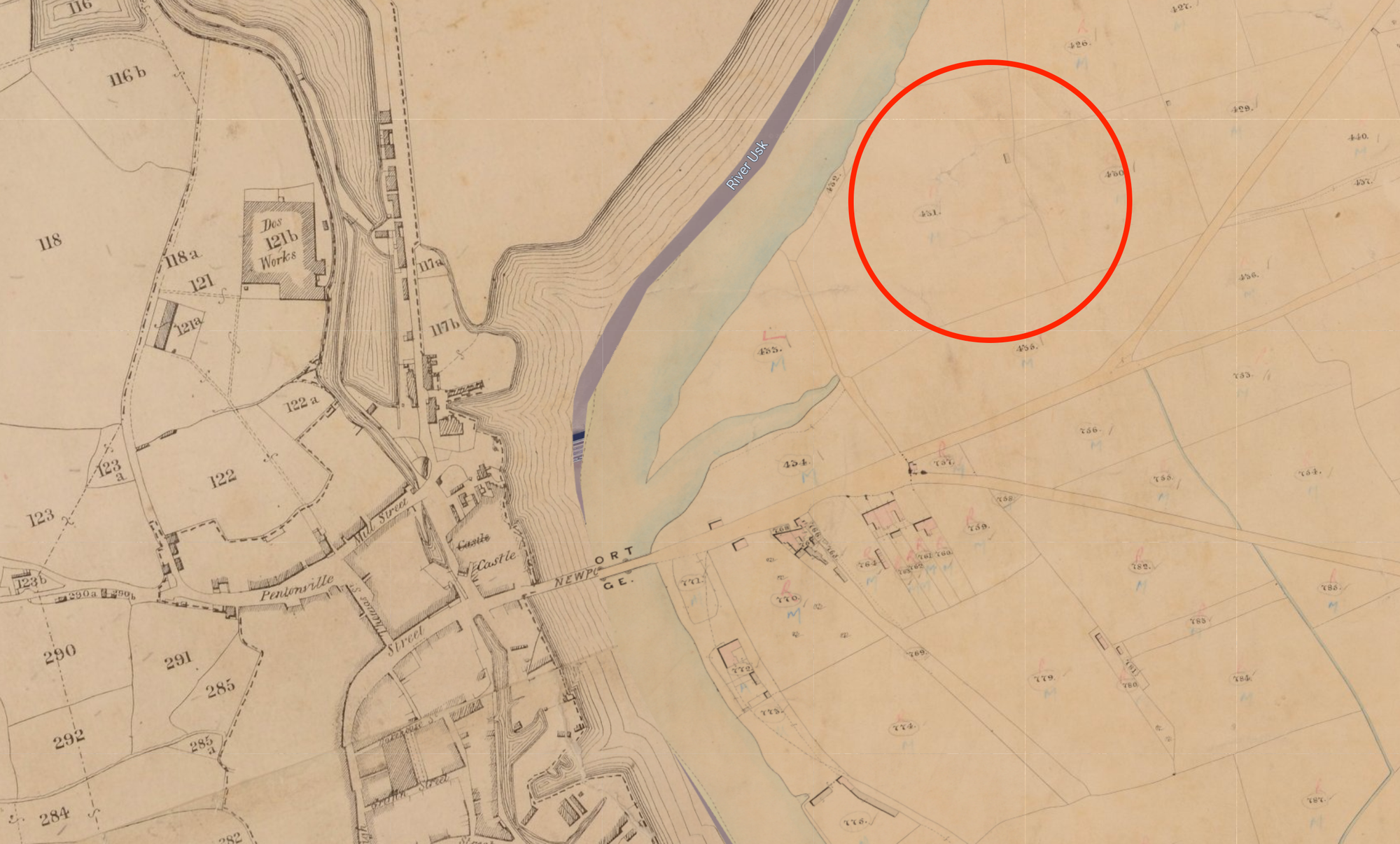
— Monmouthshire Merlin, 17th September, 1842

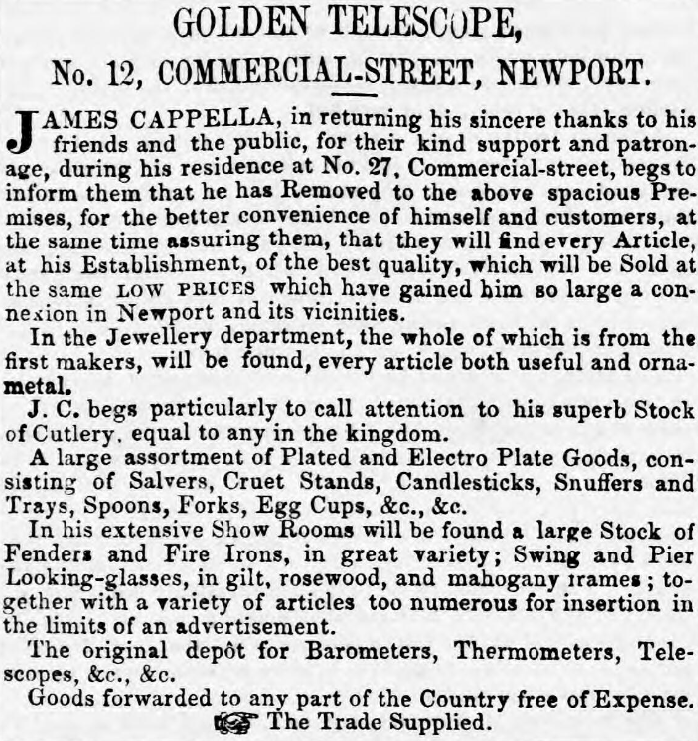

House Numbering
'A Request to Name Streets and Number Houses'
To the Editor of the Monmouthshire Merlin
Sir, I beg to call the attention of the proper authorities of the town, to the consideration of the convenience that would result to the visitants and inhabitants thereof, by the naming each street on the corners, and the regularly numbering each house.
I am, Sir, your obedient servant,
AN INHABITANT.
Newport, November 7, 1838.
— Monmouthshire Merlin, 10th November, 1838
'Number of Cambria Place, Stow Hill'
The Mayor said Mr. Wade had sent a letter to them complaining of the numbering of the houses in Cambria-place, Stow-hill. In answer to this he explained I that it had been necessary to adopt some system, so they had followed the plan carried out in London and other large places.
Stow-hill it had been decided to number consecutively, and the houses in Cambria- place would only be recognised as a part of Stow-hill but the residents could describe themselves as such and such a number Cambria-place, Stow-hill, if they saw fit.
Mr. Hewertson quite concurred in the remarks made by the Mayor it was necessary some uniformity should be observed.
Mr. Stone said they did not complain so much of the numbering as of the neglect to serve notices as required by the Act of Parliament.
The Surveyor, in answer to this, said that he had caused 1,000 handbills to be distributed with reference to the matter, and that notice was quite sufficient.
Alderman Lewis thought it was the houses that should be numbered. The other day he found a man putting a number on his yard gate, and when he remonstrated with the man about it he said he should put it where he pleased.
— Monmouthshire Merlin, 3rd March, 1871
Numbering Houses
The whole of the house numbers were fixed in time for the census, on the 3rd inst,, and as the name plates for the several courts were not ready temporary printed labels were affixed to each court, as recommended by the Registrar-General.
— Monmouthshire Merlin, 14th April, 1871



'The Captain Ross Beerhouse'
Mr. North, of the "Captain Ross" beer-house, Commercial-Street, has written us a letter, complaining that some strong aspersions have been cast on his house, by ourselves and others at the Town Council. His reading of the report is incorrect, and his threat of the law ludicrous.
He says the charge against his house is as far from the truth, as the north is from the south — that it is reformed altogether, and that, in fact, it is fit to be visited by any respectable gentleman. That is all as it should be. The Press does justice and we have thus allowed the North to celebrate "Captain Ross"!
— Monmouthshire Merlin, 22nd January, 1842

'Griffin Street Soup Kitchen'
The poor of Newport and Pillgwenlly have been relieved in great numbers with provisions and soup, during the week. A soup kitchen, with large boilers and other convenience has been fitted up in Griffin-street, and another at Pill under the superintendence of that benevolent and active almoner, Mr. Pyne. Thus the charity fund is extensively operating, to the alleviation of misery, and the prevention of crime.
— Monmouthshire Merlin, 22nd January, 1842

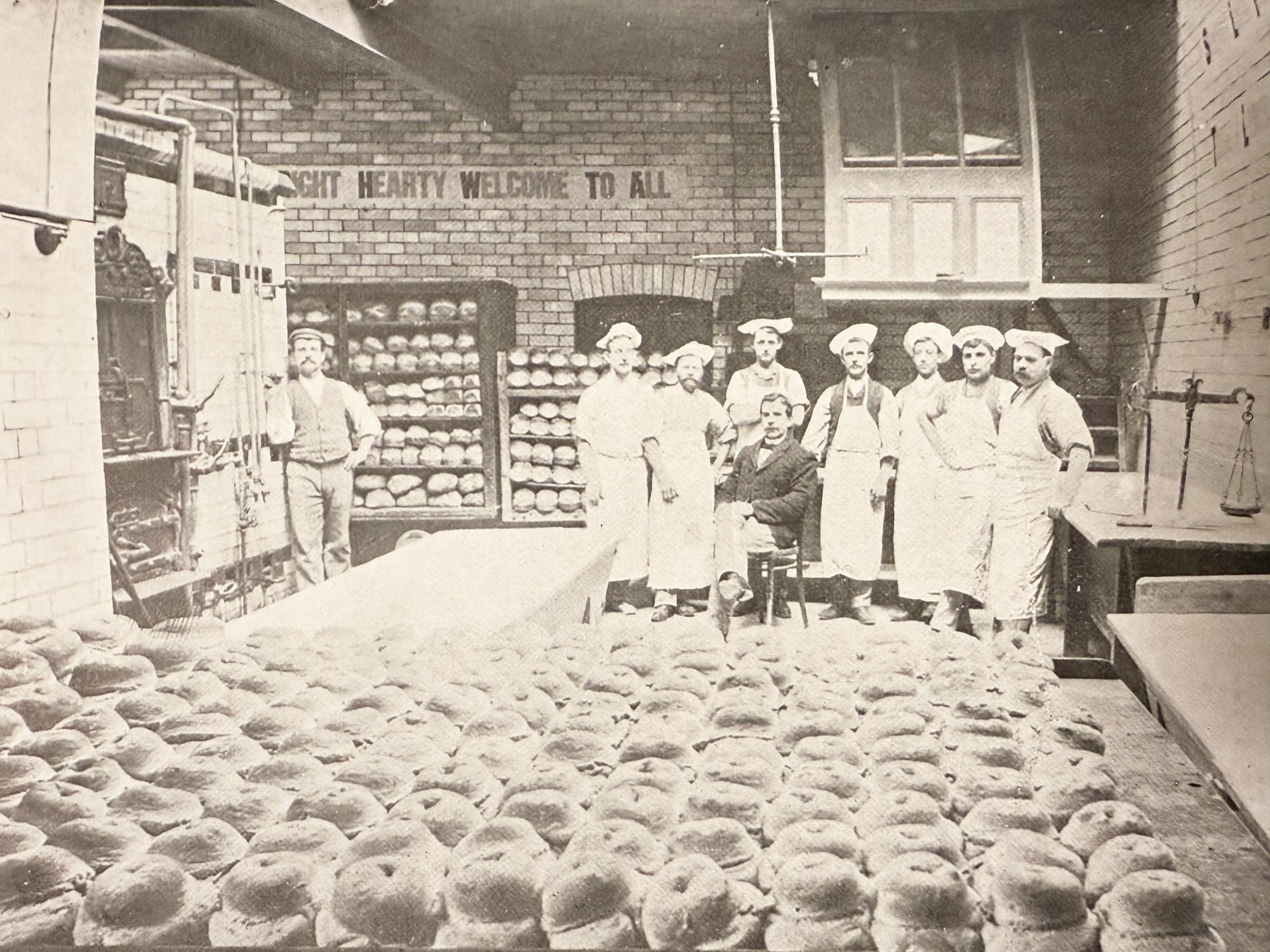

'Stealing Harnesses From Crindau'
On the 9th instant, a boatman named Thomas Phillips was apprehended by P. C. Grubb, while offering a quantity of harness for sale; and it was subsequently proved to have been stolen from Mr. Philip Williams, of Crindau, near Newport, to which place he was conveyed, and committed to Monmouth for trial.
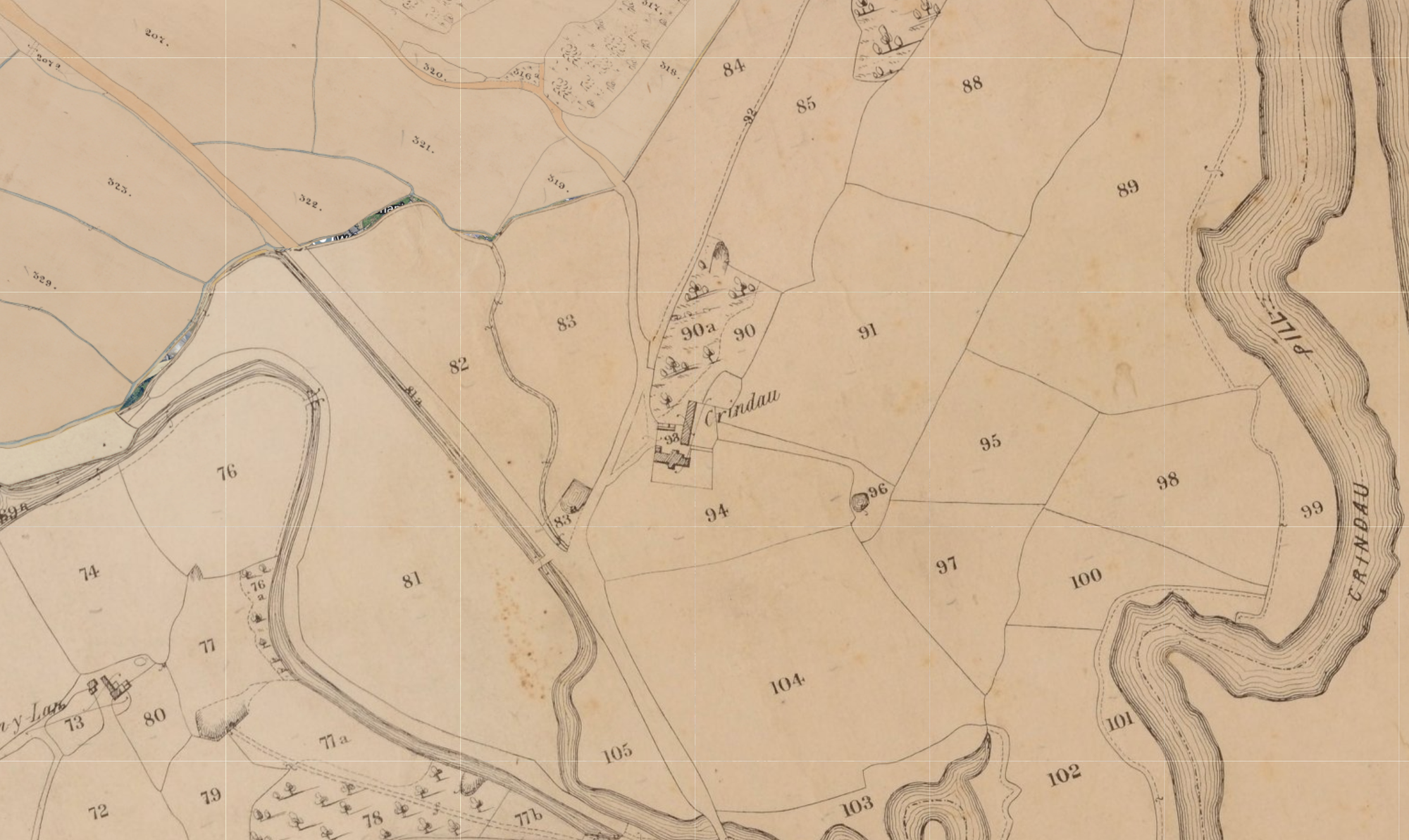
— Monmouthshire Merlin, 22nd January, 1842

'Miss Cora Cardigan at The Empire'
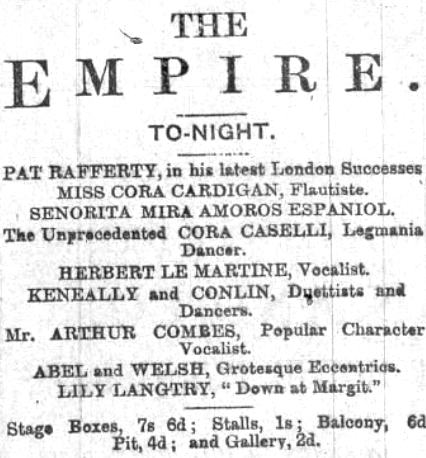
Cora Cardigan was the stage name of Hannah Rosetta Dinah Parks (1860 – 1931), an English virtuoso flautist known as the 'Queen of Flute Players' who worked mainly in theatres. She played at The Empire on at least four occasions in 1896, 1897, 1899 and 1900.
Miss Cora Cardigan displayed a rare accomplishment, for a lady, as a flute and piccolo soloist, and had a well-merited return in the shape of hearty applause.



'Mary "Pickaxe" Cecil'
Mary Cecil, alias "Pickaxe," whose face seemed worn into something much like an axe, was charged before the Mayor and Thomas Hawkins, Esq., with being found in the middle of Corn-street last Friday night, between ten and eleven o'clock, drunk, raving, cursing, and burning to fight.
P. C. Huxtable recognised her as an old tenant of the "stone jug," and finding she rather grew more tigrish than lamb-like in his presence, he wisely locked her up, to sober her down into something human. His Worship having been made duly acquainted with the present offence of the heroine of the pickaxe, and having carefully conned over a long category of previous sins, thus addressed her in his usual clear and impressive style:—
Mary, I think you have been in Newport a long time—yes, when I was mayor last, and then 1 saw you before me many times. You have been here since, and you was committed for eight and twenty days as a rogue and a vagabond on the 16th of March, 1841 you was fined again 5s. for being drunk on the 20th of June, 1840; you was tried for robbing John Jones on the 1st of June, 1840, but you was acquitted for want of evidence, you was found guilty of robbing James Howell on the 3rd of December, 1840, but was acquitted for want of evidence and you was committed to prison for 14 days on the 22nd of July, for an assault; and now I must punish you again—what can I do with you now? We will try you again, and we now — Where's your mother; have you got one, Mary? [To this touching appeal she groaned dismally]
Well, Mary Cecil, you shall he taken from this place to Usk prison, and there to remain for only, mind I say only two months, for we could give you three and we do hope that when you come back, you will be a reformed young woman.
The prisoner wiped off her crocodile tears, shammed hysterical sobs, and slyly "taking a sight," was escorted to her old quarters.
— Monmouthshire Merlin, 23rd January, 1842
"The Worst Girl in Town"
Catherine Lake, a disorderly prostitute, "the worst girl in the town," said the Superintendent, was sent to gaol for three weeks. Margaret Kilty, another of the same class, was ordered to be imprisoned for a month. Jane Wire was charged with creating a disturbance at the house of Charles Tibbets, of the Welcome All, Pillgwenlly.
The girl should have appeared on Thursday, but failing to do so was apprehended. Complainant stated that because he refused to allow her in his house, she became very violent and abusive both to himself and Mrs. Tibbets. Defendant said complainant called her "what he couldn't prove," and threw two buckets of water over her. The latter portion of this assertion he acknowledged but pleaded the provocation be had received. He said it arose from the fact of his not permitting girls of her character to frequent his house.
Defendant: 'Tis from the likes of me, you make a living."
Complainant denied this in a most positive manner. The Magistrates, in consideration of the girl having been already locked up, and been "almost drowned," sent her about her business, and ordered the complainant to pay the costs. The complainant said it was a hard case.
Superintendent Huxtable: "You know you've your house full of Dutch girls at the present moment."
Complainant said that was untrue. His house was respectably kept; and he strenuously con-tradicted the statement of the Superintendent.
A Letter From the Owner of the Welcome All
A letter from Charles Tibbets published in the same issue of the Merlin in defence of what had happened in the article above.
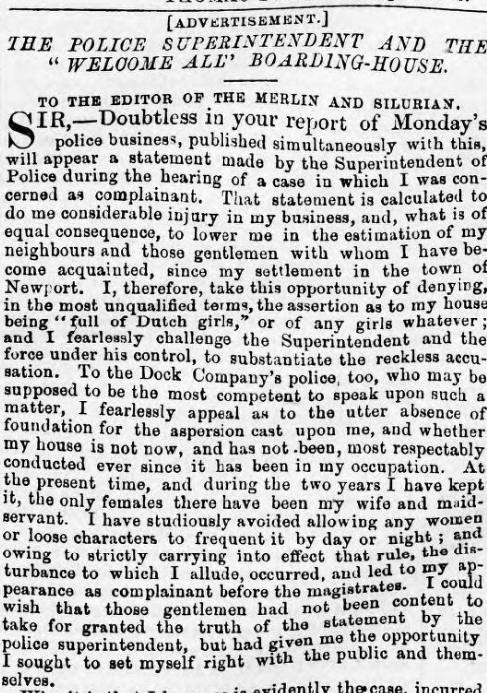
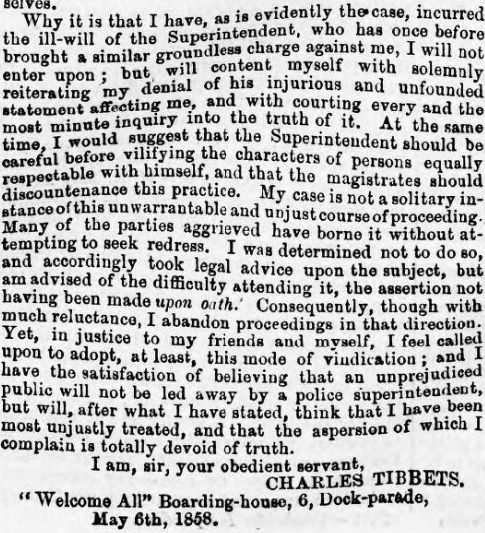
— Monmouthshire Merlin, 8th May, 1858
'Assault on Barrack Hill'
John Fevers was charged with assaulting Elizabeth Howell. Mr. Cathcart appeared for complainant. Complainant said she lived on Barrack Hill. Last Monday evening she was on her door step when defendant came up, called her foul names, threatened to break her jaw, and kicked at her. His foot just "brushed" her cheek. She went into the house. He went home about eleven o'clock, and used violent language till about two o'clock.
By the Bench: He is not a lodger. I don't know what he is—he's an interloper.
Examination resumed: He continued his threats next morning. I have now the mark of a blow which he gave me six months ago. Many years ago I consented to live with him, and had a child by him. I have left him, and wish to live alone, but he comes and makes these disturbances. I wish the protection of the Bench. I now keep a little shop.
The defendant denied that he had touched complainant. Some recrimination ensued, and ultimately the Bench bound over the defendant to keep the peace for twelve months.
— Monmouthshire Merlin, 4th August, 1866
'Stealing Shrimps'
Charles Hughes and Patrick Conner, two lads from Pillgwenilv, were charged with stealing about 10lbs. of shrimps, value 2s. 6d., from the dwelling house of James Scully, fisherman, at St. Brides. There were three other lads implicated in the theft, and the Inspector applied for a remand. Conner was bailed out.
— Monmouthshire Merlin, 4th August, 1866
'Keeping Pigs in Maindee'
Joseph Power, Joseph Dark, and Keturah Daniels were summoned for keeping pigs on their premises so as to be a nuisance at Maindee. Inspector Sheppard, also Inspector of Nuisances for the Christchurch Local Board, had visited the premises of defendants. They had a small enclosed yard, unfit to keep pigs in. It was a nuisance, although defendants did not keep it very dirty. Daniel's case was far worse than the other two. A large sow was kept in a stable near two cottages without any attempt made to clean up the place.
The Bench ordered the nuisance to be abated, and defendants had to pay the costs. A suitable caution was administered. Defendants stated that they had a sewer running along at the back of their houses which was worse than any pigs nuisance. In was enough to breed a plague.
Inspector Sheppard said he wished he had the power to alter it, but unfortunately he had not. As far as his duty was concerned be had carried it out by reporting it to the Board of Health. The sewer was said to belong to the Commissioners.
— Monmouthshire Merlin, 4th August, 1866
'Asleep at the 'Wheel' in Malpas'
Thomas Hoskins, haulier, of Newport, was charged with being asleep, without having any control of his horses, in his cart, in the parish of Malpas. Fined 10s. and costs.
— Monmouthshire Merlin, 4th August, 1866
'Breaking Three Windows'
George Williams, who had a frightfully swollen face and black eye, was charged with wilfully breaking three window panes belonging to William Pollock, beerhouse keeper, and also with assaulting a policeman.
Between two and three o'clock on Sunday morning, complainant, who was in bed, was roused by beating his windows smashed.
He rose and looked out of the window, and saw defendant dancing about the streets, with two or three tresses of onions in his hand, and which he was throwing at the windows.
In reply to complainant, who called to him, he said he was having fun. Complainant called out for the police, and P.C. Poule came up, and attempted to take him into custody, when defendant bit the officer's finger and was otherwise very violent. With the assistance of another policeman he was taken to the station.
The Chief Superintendent then said that Green, the defendant in the last case [Edward Green had been charged the same day with being drunk], had complained of the present defendant's conduct. They were locked in the same cell, and Williams attacked Green and bit his ear. The defendant said he was a tailor from Birmingham, and had only been in town three days. He was sent to Usk gaol for a month.
— Monmouthshire Merlin, 4th August, 1866

'Maindee Park, Newport — The Next Clifton?'
We (Bristol Times and Mirror) understand that this magnificent estate has recently been purchased by the Midland Land Corporation of Birmingham. It is, we believe, intended to sub-divide the estate in such a way as to make it a high-class suburban district, or a second Clifton, for which its natural beauties offer every facility.
The present mansion will be maintained, and judicious restrictions will be enforced as to the character of the houses to be erected. The plan for sub-division has been prepared by Mr. Henry Lloyd, of this city, architect, and Messrs. Sherwood, Smith, will shortly submit the property by auction, unless previously sold by private contract.
— Monmouthshire Merlin, 4th November, 1870

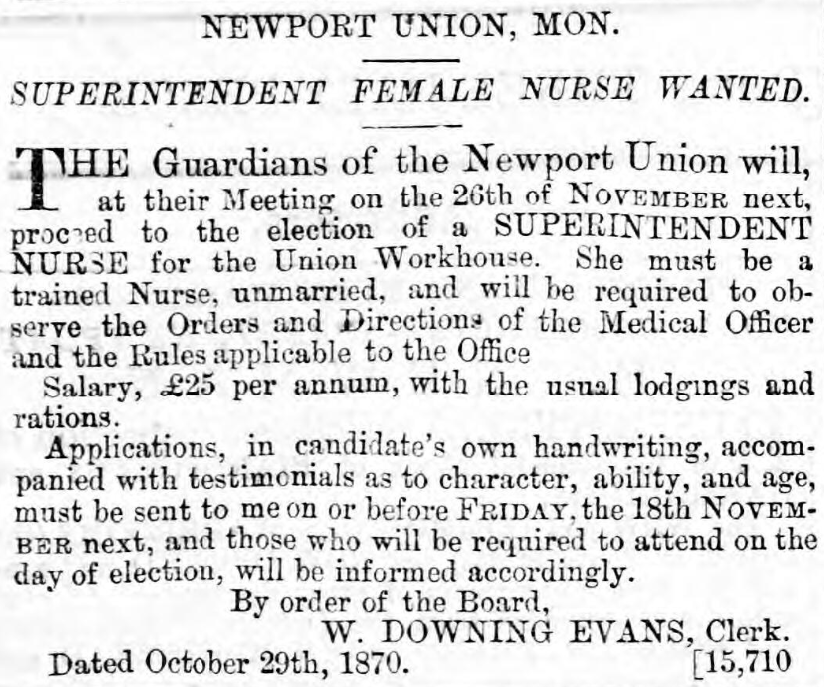

Mud in Baneswell
To the editor of the Merlin and Silurian
SIR, Allow me, through you, to call the attention of the authorities to the vile, wretched, and utterly abominable condition of the roads leading to Baneswell. They are not only ancle (sic), but knee-deep, mud.
It is suffered to accumulate there week after week, and month after month, and it is a fact that the street sweeper is never seen in that neighbourhood. Why is this? The people pay their rates, and surely deserve some attention. The Board of Health have many benedictions, of a certain sort, invoked upon them for their conduct in relation to this matter, and no one blesses them more fervently than, Sir,
Your obedient servant, Baneswell.
THIN SHOES
— Monmouthshire Merlin, 31st October, 1857

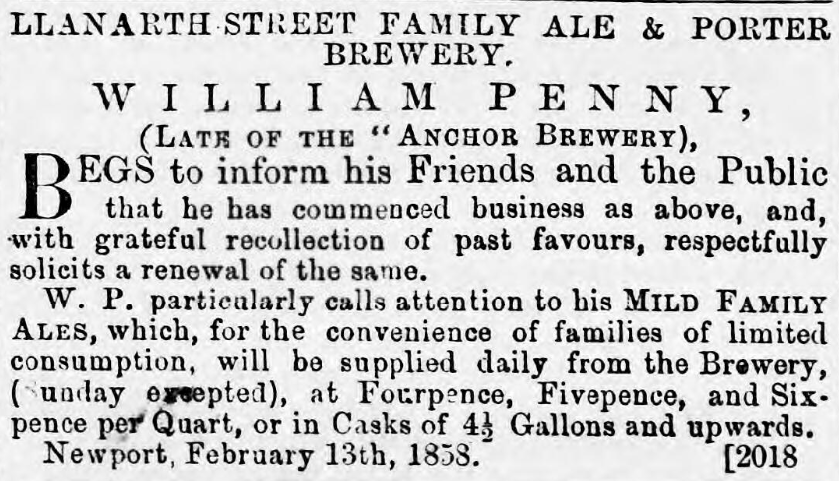

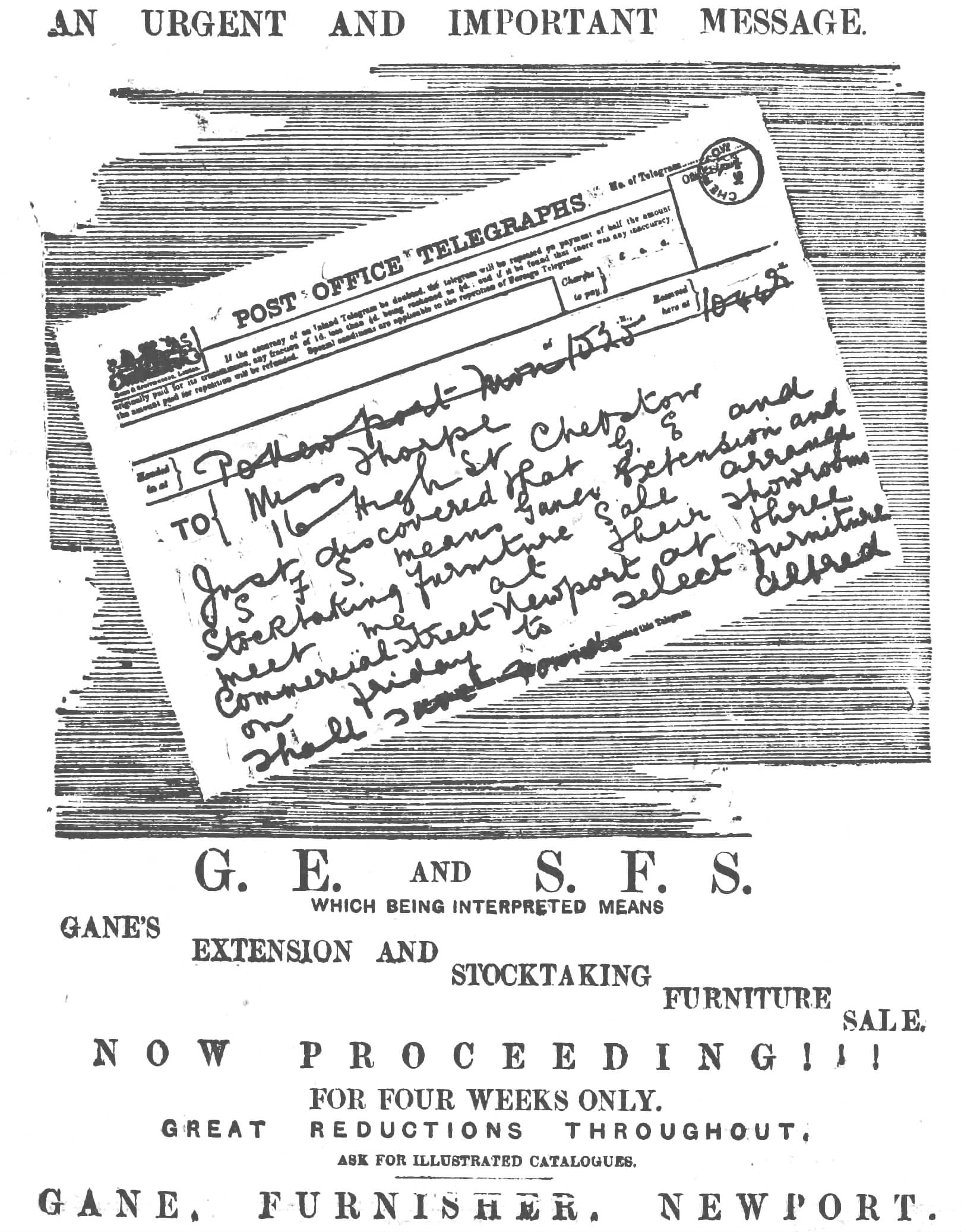

'Dolphin Pub Moves From Stow Hill To Ruppera Street'
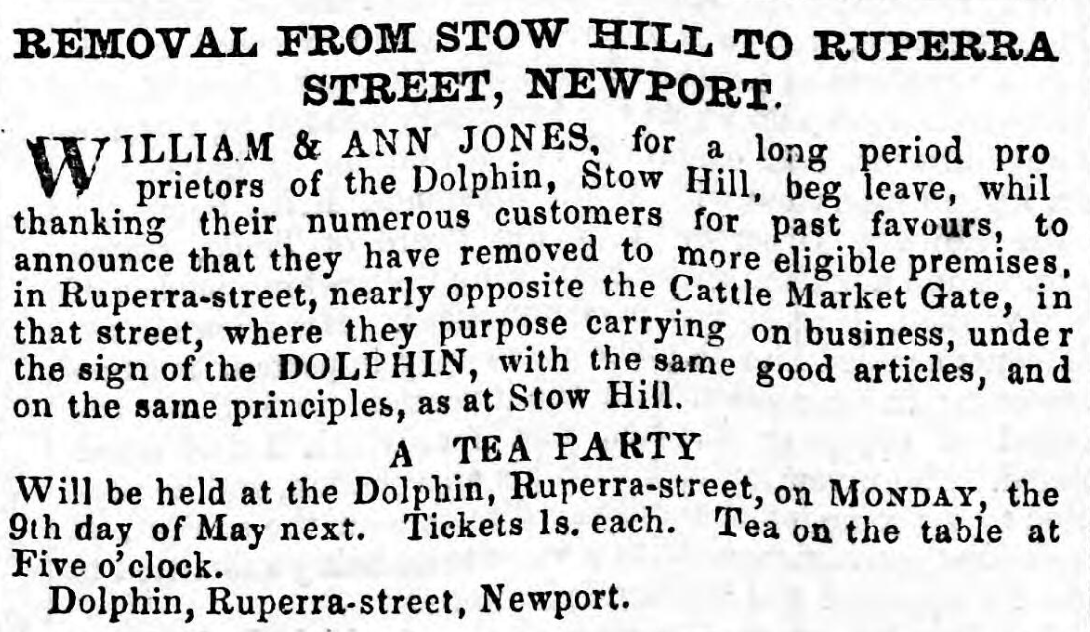
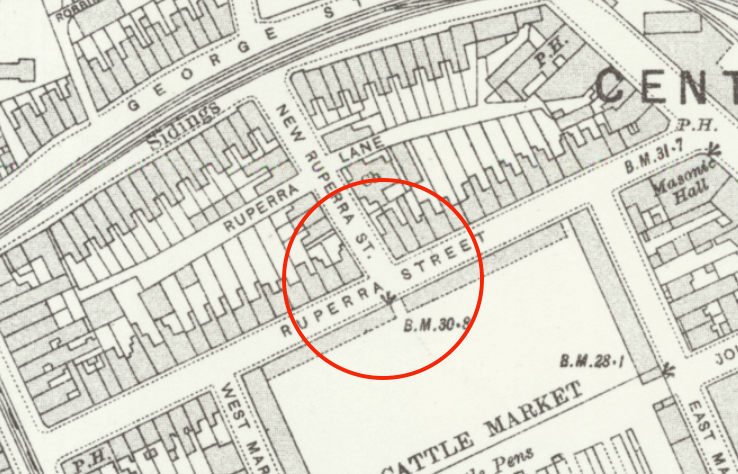


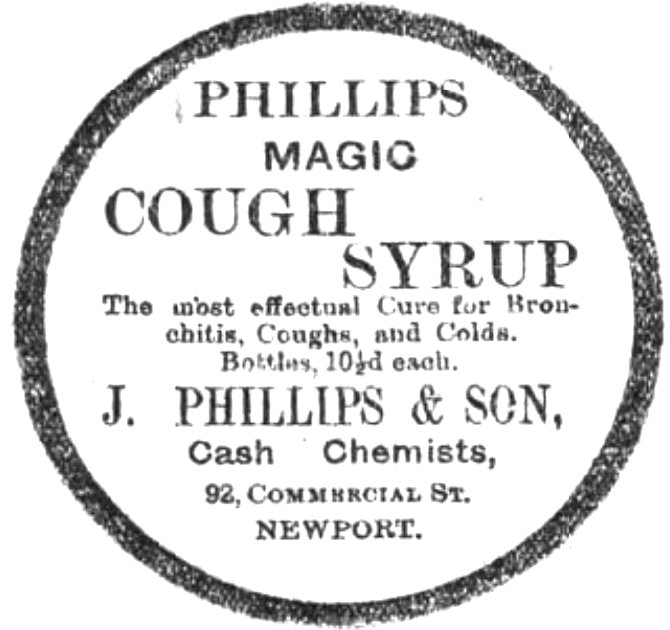
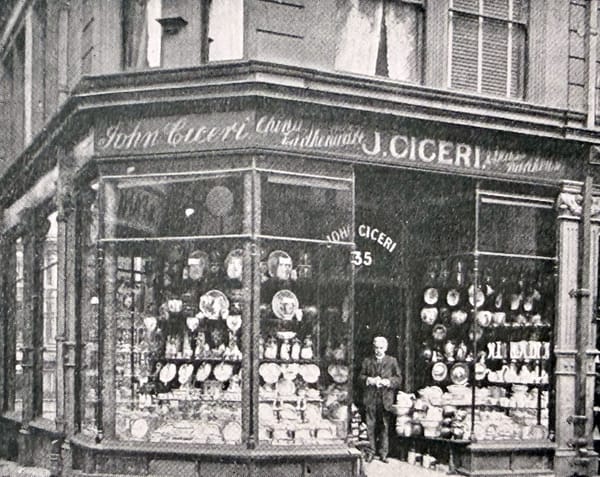
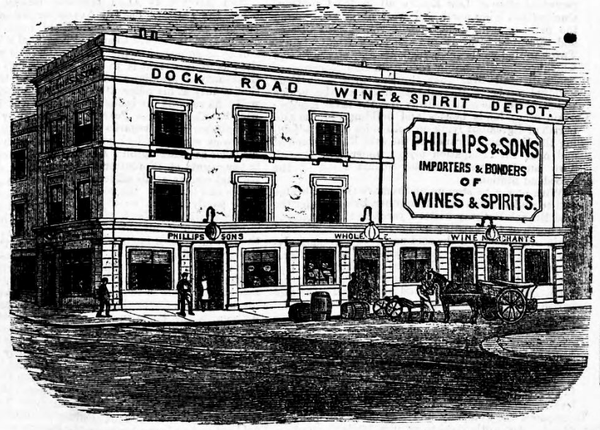
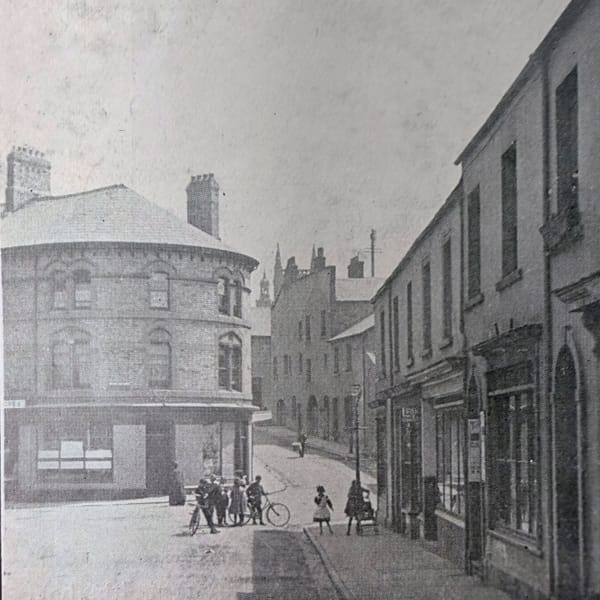
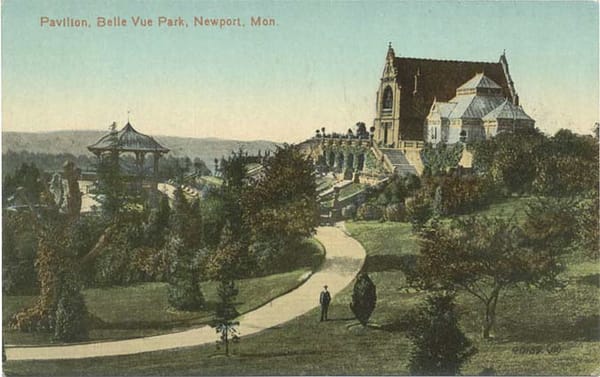
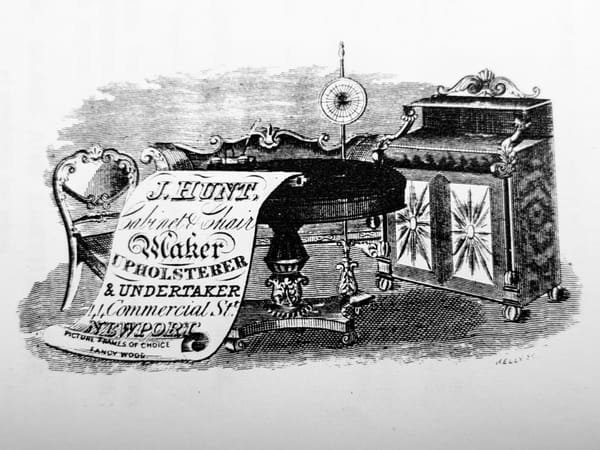
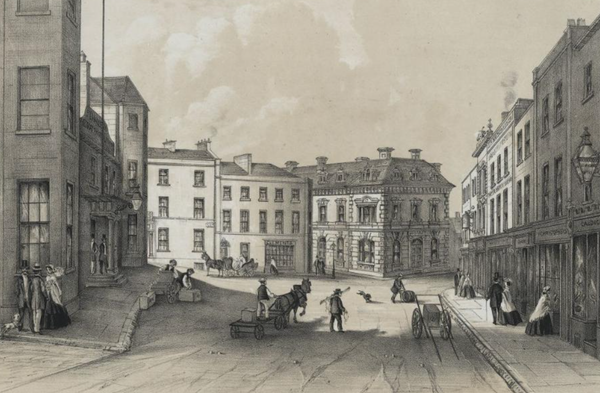
Member discussion